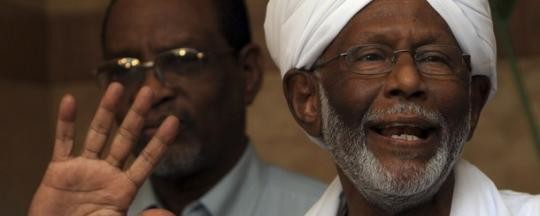Hassan al-Turabi, the Sudanese Islamist thinker who played an instrumental role in bringing to power the National Islamic Front in 1989 and institutionalizing Sharia law in Sudan, has died of a heart attack in Khartoum at age 84.
The son of a local imam from Kassala in eastern Sudan, Turabi studied law in Khartoum, London and Paris before becoming a leader in the Sudanese branch of the Muslim Brotherhood and later the Islamic Charter Front and Islamist movement more broadly.
He took political office in 1979 as Minister of Justice under the Nimeiri regime, which undertook to impose Sharia law starting in 1983. After Nimeiri’s fall from power in 1985, Turabi failed to win power in 1986 elections but was part of a coalition of Islamists and military officers who toppled the government in 1989.
Turabi was seen throughout the 1990s as something of an intellectual guide of the Bashir government. He headed the National Islamic Front and also served as parliament speaker. Latterly, however, he has headed the the opposition Popular Congress Party, which he formed after a 1999 split with President Omar al-Bashir.
Turabi is a controversial figure with some Sudanese seeing him as a unifying and even progressive figure in the Islamic Movement, while others blame him for the fall of a democratically elected government and the intensification of the civil war in South Sudan in the 1990s.
In 2004, Turabi was briefly imprisoned by the Sudanese government for suspected associations with the Darfur rebel group Justice and Equality Movement, whose leader Khalil Ibrahim was a former Turabi follower. Turabi was critical of the government’s bloody tactics in Darfur, where it has battled both Islamic and secular rebels for more than a decade.
As an opposition leader over more than a decade until his death, Turabi was less influential than he had been in power in the 1990s, but he continued to be a prominent voice in Sudanese politics and society. Most recently, his party was a key part of the National Dialogue and has called for the formation of a transitional government to take over from the ageing President Bashir.
Turabi’s term for this proposed transitional government – the nizaam al-khaalif, or ‘successor regime’ – uses the same Arabic root for Caliphate, suggesting that Turabi never stopped dreaming of an Islamic renaissance.
Thousands of supporters gathered on Sunday at Turabi’s burial, which took place at Burri al-Lamab in eastern Khartoum. First Vice President Bakri Hassan Saleh, ministers and other dignitaries attended the funeral, but President Bashir did not.
Ibrahim al-Sanusi, the deputy chairman of the Popular Congress Party, will succeed Turabi as head of the Islamist opposition party.




